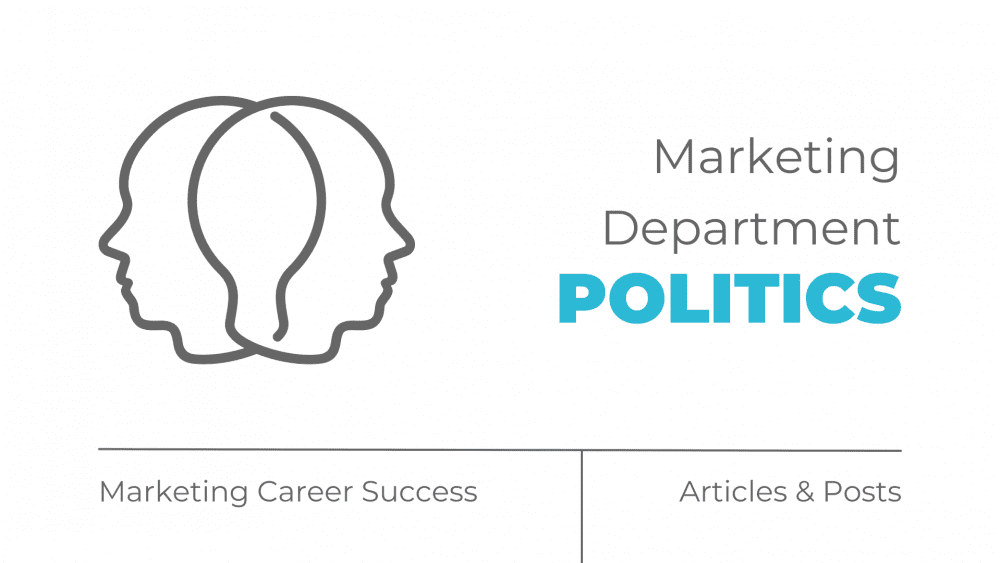Politics… ugh.
It’s a word that often elicits negative connotations and feelings of stress.
However, it’s no secret that politics exist in every department of every company, including the marketing department.
How do you handle marketing department politics and survive in corporate?
In the marketing department, politics typically refer to the power dynamics and relationships between employees.
It’s about who has influence and control over decisions, resources, and opportunities.
Overview of Politics in a Marketing Department
Some people believe that “office politics” are evil, and they can avoid them completely.
This simply isn’t true.
Attempting to avoid politics can actually ruin your reputation and your job.
“Given my approach, it’s unsurprising that I was entirely unprepared and out of my depth when, several years into my career, I was laid off. It wasn’t because I was performing poorly or failing to meet my goals. It was because I had neglected to form relationships with people who had the power to advocate for my job.” -Niven
Postma from the Harvard Business Review
Like it or not, politics are something every good marketer has to face.
With diverse team members, varying backgrounds, and personalities, conflicts often arise.
Having a clear understanding of the political landscape can create a positive work environment, increase productivity and enhance creativity.
Politics in a marketing department can be in the form of power struggles, influence, and persuasion, and it is essential to navigate these waters wisely.
Creating an atmosphere where everyone’s ideas and perspectives are respected fosters a culture of inclusivity, improves communication and infuses the department with energy.
By fostering an environment that encourages collaboration and healthy dialogue, you can leverage politics in the marketing department to gain a competitive edge, and achieve the desired results.
We will talk about these things in more detail next.
The Importance of Strong Communication and Interpersonal Skills
Effective communication and people skills are super important, whether it’s in your personal or professional life.
Being able to connect with others and get your point across can make a real difference in building relationships, sealing deals, and leading teams.
And let’s not forget about those interpersonal skills!
They’re just as important in helping us interact positively with others, understand their perspective, and build trust.
In today’s fast-paced world, mastering these skills is key to achieving success.
When you’re a good communicator, you can express your ideas and thoughts clearly, honestly, and with empathy.
And when you develop strong interpersonal skills, you can truly connect with others on an emotional level, forming genuine relationships and earning their trust.
That’s why it’s so important to prioritize and invest in honing these skills.
Trust me, it’ll pay off!
Using Diplomacy as a Tool for Conflict Resolution
In today’s world, conflicts are an inevitable part of life.
The drama is going to happen at some point.
Whether it’s a disagreement between individuals or nations, finding a resolution can be challenging.
One effective tool for conflict resolution is diplomacy.
What is diplomacy?
“Diplomacy is the art and science of maintaining peaceful relationships between nations, groups, or individuals.” – the National Geographic Society
Diplomacy involves using communication and negotiation to reach a peaceful agreement between parties.
In order for diplomacy to be successful, it’s important to listen to the concerns and needs of all parties involved.
This requires a certain level of emotional intelligence and understanding, as well as a willingness to compromise.
By utilizing diplomacy as a tool for conflict resolution, we can work towards creating a more peaceful and harmonious world.
Negotiation Tactics for Problem-Solving
In any negotiation, it’s important to approach the task with a clear strategy in mind.
One effective tactic for problem-solving is to focus on identifying the underlying interests of all parties involved.
By understanding each person’s motivations and priorities, it’s possible to find common ground and explore solutions that address everyone’s needs.
Remember to step back and be as objective as possible, instead of starting out with a strong opinion.
Another helpful strategy is to actively listen and ask questions.
This not only shows that you value the other person’s perspective, but can also uncover valuable information that can help move things forward.
Finally, remember to be flexible and open to creative solutions – sometimes the most productive outcomes come from a willingness to think outside the box.
Overall, negotiation is a valuable skill that can be cultivated with practice and a willingness to approach each situation with an open mind.
The Need for Patience, Resilience, and Empathy
It’s so easy to forget that patience, resilience, and empathy are super important qualities to have.
You know, we tend to rush through things and focus on our own goals, but taking the time to be patient with others can really make a big difference in building meaningful relationships.
And let me tell you, being resilient is a total game-changer.
It helps us bounce back from setbacks and obstacles on our journey.
Empathy is like the secret sauce of emotional intelligence.
It lets us connect with others on a deeper level and make a positive impact on society.
You may think, “I just want to do my job and forget about people.”
But in reality, it’s people who make things happen.
Therefore, having patience, resilience, and empathy are crucial for navigating office politics effectively and building a successful career.
At the End of the Day…
Navigating office politics may seem daunting, but with the right mindset and skills, it can actually be a positive experience.
By prioritizing strong communication and interpersonal skills, utilizing diplomacy and negotiation tactics, and practicing patience, resilience, and empathy, you can create a work environment that fosters collaboration and creativity.
So don’t shy away from getting involved in the political landscape of your marketing department – embrace it and use it to your advantage.
Who knows, you may just become a master at navigating office politics!


Comments are closed.